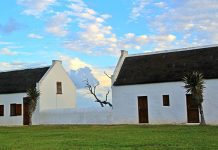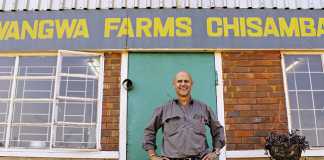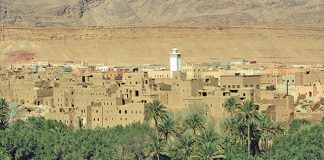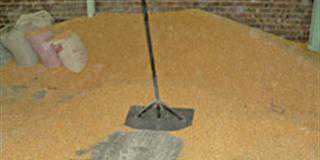Wim Scholtz is a family man at heart. In his spare time you will most probably find him and his family and friends having a braai or racing motorbikes and quad bikes. Second only to his family, is his dedication to his farm.
Wim began farming with his dad on the farm Vaallaagte in 1996 and in 1999 he took over the farming operation. Today the entire farm, including the original and additional farms acquired in later years, is about 4 500ha. The farm has a rich history as it’s been in the family for 134 years and is likely to remain so for many years to come. Wim’s and his wife Anchen’s son, Jovan, now two years old, is already developing a keen interest in farming, especially cattle. “I am trying to cultivate a love for farming in him,” Wim says.
He says he will never forget harvesting his first crop. In his second last year at university he came home for holidays and planted his first potato and onion crop, and in his final year he harvested this crop. Wim completed his B Agric at the University of Stellenbosch before he started farming.
He saw it fit to specialise in subjects such as business science and agricultural economics, instead of technical farming subjects. “I did this because it is not wise to trust someone else with your finances,” he says, adding that there are enough experts in areas such as fertiliser requirements and plant science whom farmers can consult.
Diversification the answer
Wim says that the key to farming successfully in the midst of today’s tough farming conditions is diversification. “This is the most important facet of my farming,” he says. His enterprise consists of potatoes (50%), paprika (20%), cattle (15%), onions (10%) and grain crops (5%).
Diversification enables him to spread the financial risk and provides consistent cash flow all year round. From December to February potatoes are harvested, from May to August, paprika, from September to November, onions, and from April to May, grains. A drawback to diversification, though, is that it prevents the farmer from specialising in a particular product.
Wim says the climate of the Vryburg area counts in his favour. “It is the best area for beef and my Bonsmaras thrive under dry conditions,” he says, adding that Bonsmaras perform well under extensive grazing conditions. Although the soil is fairly sandy on the farm, crops grow well in the hot summers. He grows maize to produce feed for his cattle. “To grow maize on a large scale under irrigation is not financially viable in this area,” he says.
One disadvantage of the area is that it is located far from markets. “This limits what can be grown in the area,” he comments. A farmer cannot grow high-value products such as flowers, or certain fruit and vegetables such as pumpkins and tomatoes.
Profitable farming
Potatoes and paprika make the largest contribution to his farming income, but Wim says a large percentage of profit can be made from operational savings on the farm. One way is to operate your own transport to and from the market, instead of outsourcing. He transports about 80% of his products to the market, makes his own cattle feed, slaughters his animals and does his own direct marketing.
Input costs are a major expense in his farming operation; this is why any form of saving on the farm will assist in increasing profit margins. It costs about R70 000 to establish one hectare of potatoes and about R20 000 for one hectare of paprika.
Wim provides training to all his permanent labour in the operation of farm machinery. “Machinery available to farmers today is very technologically advanced,” he says. If technology is not operated properly the farmer can incur huge costs to repair machinery. Wim has eight permanent labourers and employs about 170 seasonal workers in the harvesting period. “Labour is a plus point in my farming. The most important thing is to pay your workers well and to keep them motivated,” he advises.
He says in the event of a very dry year, it is beneficial to farm with a crop such as paprika because it performs well in dry conditions and dry summers. “The income from paprika carries me when the income from potatoes is bad,” he explains. The downside to this crop is that it is very labour-intensive. To harvest 50ha requires 170 labourers.
Another difficulty is that there are no herbicides available for paprika. Wim says the industry is too small to warrant the registration of chemicals. After harvesting, the paprika is sun-dried on large plastic sheets. This method works very well because the area is so hot, even in winter.
Once harvesting is complete Wim prefers to prepare and clean the fields as soon as possible for the next season. The sooner crop residues are worked into the soil, the longer is the resting and nutrient absorption period. “Land preparation is very important, especially if you are farming under irrigation,” he stresses.
On success
“You must believe in yourself and in God,” Wim says, adding that achieving success is not just about making money. “You have to help others to get to the top. You must enjoy what you are doing, otherwise it is a waste of time,” he says. A farmer should also farm in a dynamic way. “You must constantly see growth on your farm. Recognise the shortcomings and attend to them.”
Wim says it is an achievement to be nominated as a finalist in the competition, but he doesn’t think he is better than anyone else. “Farming today is in itself an achievement,” he says, adding that competition is an opportunity for self-improvement.
He likes being a hands-on farmer. “I want to be on the tractor, on the planter and even want to help sorting,” he says. Wim is satisfied with the size of his farming operation and doesn’t necessarily want to expand the farm. “What is more important is to maximise the potential of what you already have.”
His vision
Wim’s vision for his operation is to create a financially healthy, low-risk production unit that can expand steadily in an uncertain farming environment. He says although agriculture makes a relatively small contribution to SA’s gross domestic product, the sector is still important. “Agriculture provides jobs to a large number of people who are relatively low-skilled.”
He thinks young farmers have a critical role to play in the future of South African agriculture. He says it is their responsibility to be innovative in areas such as technology, they must be forward-thinking and transfer practical farming knowledge to the next generation.
Contact Wim Scholtz on 082 338 4704.













